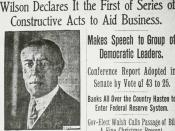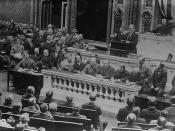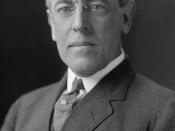THEME: Progressive Presidents: Theodore Roosevelt, Taft and WilsonReading: Making A Nation, pp. 614-22.
1.Is "trust buster" an appropriate nickname for Theodore Roosevelt?-Roosevelt was 42 when he became president (youngest man to attain the presidency)-was a Mugwump (Republican)-delivered a speech called The Strenuous Life-the Supreme Court made the Sherman Anti-Trust Act powerless and it one of the few laws that allowed federal action against monopolies-Justice Department revitalized the Sherman Act with vigorous prosecution of the worst offenders-Roosevelt selected cases for maximum publicity value-Attorney General Knox filed suit against J.P. Morgan's holding company, Northern Securities-the court awarded Roosevelt with a victory-because of this case, Roosevelt gained the underserved reputation as a trust buster-he opposed major monopolies, but he also did not want the extreme of destroying all monopolies-he also distinguished between good and bad trusts, and he believed the government should restrain the bad and encourage the good2.How well did Theodore Roosevelt deal with domestic policy and foreign policy?-his foreign policy aimed to keep the United States in the ccentral stream of globalizing processes such as commerce, imperialism, and military (particularly naval) modernization-he felt that the United States should interfere with backward governments in Asia, Latin America, or Africa, that blocked the progress of civilization-the United States has a moral duty to overthrow governments in such cases-stability and order in terms of foreign policy-wanted to build an interoceanic canal-pressed Britain to drop its claim to joint control over a canal-urged Congress to choose the Columbian province of Panama as the site-announced a policy later known as the Roosevelt Corollary-wrongdoing in a Latin-American country required "intervention by some civilized nation," meaning the United States-Roosevelt enforced order in the Caribbean and therefore, extended progressivism beyond the borders of the United States-to use the military if necessary to stabilize the regimes...


